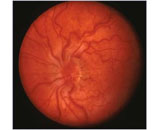Hyperviscosity Syndrome (HVS)
Hyperviscosity Syndrome

Hyperviscosity syndrome is a group of symptoms triggered by increase in the viscosity of the blood. Symptoms of high blood viscosity include spontaneous bleeding from mucous membranes, visual disturbances due to retinopathy, and neurologic symptoms ranging from headache and vertigo to seizures and coma.Hyperviscosity occurs from pathologic changes of either cellular or protein fractions of the blood such as is found in polycythemias, multiple myeloma, leukemia, monoclonal gammopathies such as Waldenström macroglobulinemia, sickle cell anemia, and sepsis.Types of hyperviscosity syndromes vary by pathology; including serum hyperviscosity, which may cause neurologic or ocular disorders; polycythemic hyperviscosity, which results in reduced blood flow or capillary perfusion and increased organ congestion; and syndromes of hyperviscosity, caused by reduced deformability of red blood cells, often evident in sickle cell anemia.
Organism species: Mus musculus (Mouse)
- Disease model DSI676Mu01 Mouse Model for Hyperviscosity Syndrome (HVS) In Stock
- Disease model DSI676Mu02 Mouse Model for Hyperviscosity Syndrome (HVS) In Stock
- Disease model DSI676Mu03 Mouse Model for Hyperviscosity Syndrome (HVS) In Stock
- Customized Service n/a Tissue of Hyperviscosity Syndrome (HVS) (If Necessary) Tissue Customized Service Offer
- Customized Service n/a Serums of Hyperviscosity Syndrome (HVS) (If Necessary) Serums Customized Service Offer
Organism species: Rattus norvegicus (Rat)
- Disease model DSI676Ra01 Rat Model for Hyperviscosity Syndrome (HVS) In Stock
- Disease model DSI676Ra02 Rat Model for Hyperviscosity Syndrome (HVS) In Stock
- Disease model DSI676Ra03 Rat Model for Hyperviscosity Syndrome (HVS) In Stock
- Customized Service n/a Tissue of Hyperviscosity Syndrome (HVS) (If Necessary) Tissue Customized Service Offer
- Customized Service n/a Serums of Hyperviscosity Syndrome (HVS) (If Necessary) Serums Customized Service Offer
Organism species: Cavia (Guinea pig )
- Disease model DSI676Gu01 Cavia Model for Hyperviscosity Syndrome (HVS) In Stock
- Disease model DSI676Gu02 Cavia Model for Hyperviscosity Syndrome (HVS) In Stock
- Disease model DSI676Gu03 Cavia Model for Hyperviscosity Syndrome (HVS) In Stock
- Customized Service n/a Tissue of Hyperviscosity Syndrome (HVS) (If Necessary) Tissue Customized Service Offer
- Customized Service n/a Serums of Hyperviscosity Syndrome (HVS) (If Necessary) Serums Customized Service Offer
Organism species: Oryctolagus cuniculus (Rabbit)
- Customized Service n/a Model for Hyperviscosity Syndrome (HVS) Disease Model Customized Service Offer
- Customized Service n/a Tissue of Hyperviscosity Syndrome (HVS) (If Necessary) Tissue Customized Service Offer
- Customized Service n/a Serums of Hyperviscosity Syndrome (HVS) (If Necessary) Serums Customized Service Offer
Organism species: Canis familiaris; Canine (Dog)
- Disease model DSI676Ca02 Canine Model for Hyperviscosity Syndrome (HVS) In Stock
- Customized Service n/a Tissue of Hyperviscosity Syndrome (HVS) (If Necessary) Tissue Customized Service Offer
- Customized Service n/a Serums of Hyperviscosity Syndrome (HVS) (If Necessary) Serums Customized Service Offer


